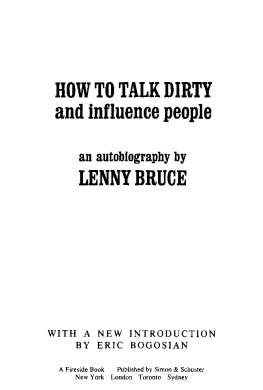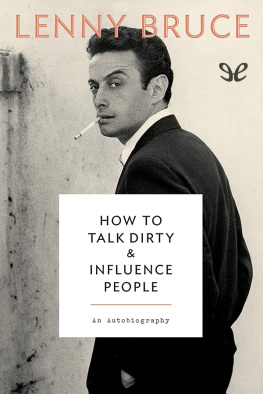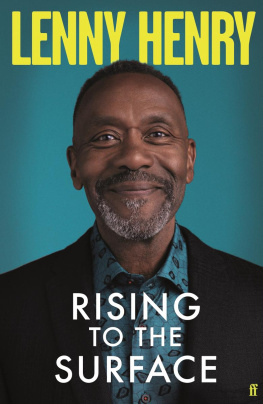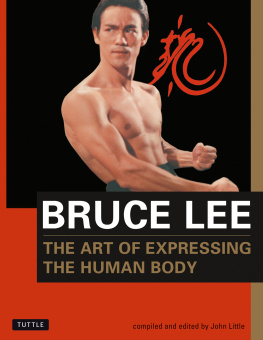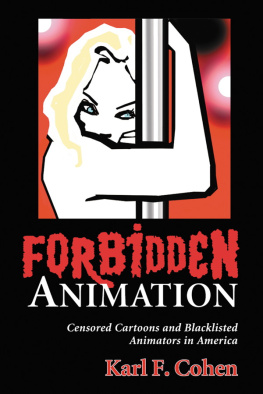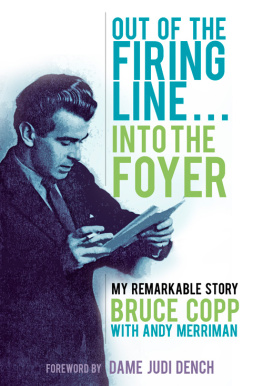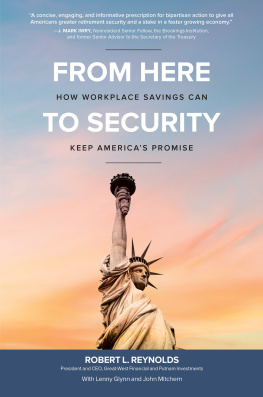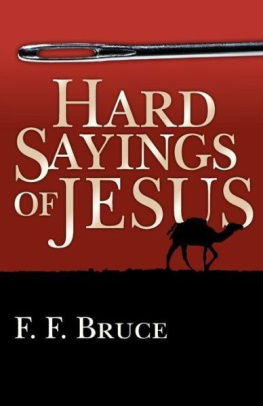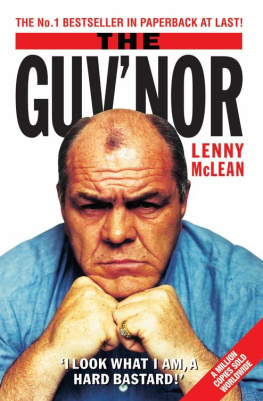Lenny Bruce - How to Talk Dirty and Influence People
Here you can read online Lenny Bruce - How to Talk Dirty and Influence People full text of the book (entire story) in english for free. Download pdf and epub, get meaning, cover and reviews about this ebook. year: 1992, publisher: Touchstone, genre: Non-fiction. Description of the work, (preface) as well as reviews are available. Best literature library LitArk.com created for fans of good reading and offers a wide selection of genres:
Romance novel
Science fiction
Adventure
Detective
Science
History
Home and family
Prose
Art
Politics
Computer
Non-fiction
Religion
Business
Children
Humor
Choose a favorite category and find really read worthwhile books. Enjoy immersion in the world of imagination, feel the emotions of the characters or learn something new for yourself, make an fascinating discovery.
- Book:How to Talk Dirty and Influence People
- Author:
- Publisher:Touchstone
- Genre:
- Year:1992
- Rating:4 / 5
- Favourites:Add to favourites
- Your mark:
- 80
- 1
- 2
- 3
- 4
- 5
How to Talk Dirty and Influence People: summary, description and annotation
We offer to read an annotation, description, summary or preface (depends on what the author of the book "How to Talk Dirty and Influence People" wrote himself). If you haven't found the necessary information about the book — write in the comments, we will try to find it.
How to Talk Dirty and Influence People — read online for free the complete book (whole text) full work
Below is the text of the book, divided by pages. System saving the place of the last page read, allows you to conveniently read the book "How to Talk Dirty and Influence People" online for free, without having to search again every time where you left off. Put a bookmark, and you can go to the page where you finished reading at any time.
Font size:
Interval:
Bookmark:
FIRESIDE Rockefeller Center 1230 Avenue of the Americas New York, New York 10020
Copyright 1963, 1964, 1965 by Playboy Introduction copyright 1992 by Eric Bogosian
All rights reserved
including the right of reproduction
in whole or in part in any form.
First Fireside Edition, 1992
Published by arrangement with Playboy Enterprises, Inc., 680 North Lake Shore Drive, Chicago, Illinois, 60611
FIRESIDE and colophon are registered trademarks of Simon & Schuster Inc.
Manufactured in the United States of America
20 19 18
Library of Congress Cataloging-in-Publication Data Bruce, Lenny.
How to talk dirty and influence people: an autobiography/ by Lenny Bruce: with a new introduction by Eric Bogosian. 1st Fireside ed. p. cm.
A Fireside book.
1. Bruce, Lenny. 2. ComediansUnited States Biography.
92-887
CIP
PN2287.B726A3 1992 792.7'028dc20 [B]
I dedicate this book to all the followers of Christ and his teachings; in particular to a true Christian Jimmy Hoffabecause he hired ex-convicts as, I assume, Christ would have.
Introduction
As long as I can remember, Ive liked the work of Lenny Bruce. I liked him before Id even heard of him, before Id heard his routines. How is that possible? Because Lenny was always there. His dark, sexy, idealistic, smirking humor was there when my parents were drinking martinis, doing the cha-cha, and flirting with their suburban neighbors.
It was there when I was driving cross-country, chain-smoking joints, eating black beauties, and grooving to Coltrane and Hendrix on the eight-track.
It was there when I was doing the punk rock death trip in the dark canyons of Manhattan.
Lenny was there through it all, the spirit of Hipness past, present, and future. Saint Lenny, I should call him; he died for our sins. As the pendulum slowly shifts, we are back in such conservative times as those that spawned him in the first place, and so nows the time to read him.
Attitude is what Lenny Bruce is all about. He was the genius of Attitude. If you dig Lenny, you dig the Attitude. Lenny was one of the bridges existing between post-war African-American culture and the counterculture culture of the 60s and 70s. Just as the Rolling Stones and the Animals ripped off R & B, or MTV absorbed rap music, Lenny hooked into the jazz mentality.
Growing up in the suburbs I got to know Lenny through his albums and primarily through How to Talk Dirty .... This book was part of a secret collection of sacred texts that unlocked the doors of hipness and rebellion. In 1970, if you were hip to Lenny Bruce, you were hip. As the years have gone by, Lenny has become more an icon than a force. Everyone has an idea of what Lenny Bruce stood for, but it is vague and general (He was... you know... dark, cool, hip). (I am often compared to Lenny Bruce. People even say I look like him. I say, I dont look anything like Lenny Bruce. I look like Dustin Hoffman in the movie Lenny.)
If youre like me, Lenny has been an influence, good and bad. By the mid-70s, the Lenny-as-martyr mythology was solidly in place (Albert Goldmans cynical biography Ladies and Gentlemen, Lenny Bruce!! and the
Vll
Julian Barry play Lenny only served to make the foundation more secure). The Vietnam War had become an experience in the past tense and little did anyone know that America was soon to be engulfed in the postmodern fascistic antics of the Reaganites. In the 70s, the idea of the 60s got cleaned up and polished. Everyone had long hair, everyone had been against the war, men were becoming more sensitive, black people were wonderful, it was cool to be gay... yadda-yadda-yadda (as Lenny would say). In the 70s everyone wanted to be cool. And no one wanted to grow up.
The new attitudes turned out to be mostly veneer, but we believed that we believed them. And presiding over our glorioiis and heartfelt beliefs (untested by life or lifes problems) were the Saints of the New Attitude. Among the saints were John Lennon, Bob Dylan, Jim Morrison, Abbie Hoffman, Lenny Bruce. Basically a lot of white men. White men on drugs with groupies. (Plus a change ....)
Central to the philosophy of the New Attitude was the notion that a Big Bad Daddy Government was suppressing and repressing all of us. (Easy to believe after Vietnam and Watergate.) We wanted more and better political action (without the complexities of politics) and we needed more and better freedom (without the dangers of overdose, veneral disease, or poverty). Money was out, lifestyle was in. We wanted a brave new world that was founded on utopian principles; where there would be no hypocrisy; where love would rule and wars would be banished. Where everyone would be nice to each other, and we could be high all day, and no one would work at anything they didnt feel like doing and no one ever got sick or died.
We just had to get away from Big Bad Daddy. We had to get out of the house. And we wanted the keys to the car.
Lenny was a worker. He wanted it (to quote his character Buddy Bob the car salesman). And he gigged and he gigged and he gigged in toilets, jazz clubs, everywhere, and anywhere. As he said himself, he was only too happy to sell out. That meant appearances on TV. But he didnt mesh with such a tidy commercial environment. He developed jazz habits: enjoying ones work, doing it for the sake of expression and fun, exploring new ground, taking chances. These were jazz laws, and Lenny brought them to comedy. (Also check out Lord Buckley, Jonathan Winters, Redd Foxx.) He also brought the attitude of minority culture with its endless self put-down and riffing about the Man and its conspiratorial posture of the inside joke, using code words and phrases (Lenny somehow melded Black and Yiddish vernacular).
(A couple of years ago I paid homage to Lenny by dropping by one of his favorite spots in San Franciso, the Hungry i. Its now a strip joint and when I poked my head in the door the woman at the counter said Can I help you with something? I said, I just want to take a look at the place, someone I know used to play here. She said Whats his name? I said Lenny Bruce. She said What instument does he play?)
The attitude of rebellion and new-found freedom was genuine for a young Jewish guy in the late 50s or a Black in the 60s. It was becoming OK, even cool, to admit to being Jewish or Black. (Lenny mentions that in the armed forces, as late as WWII, being a Jew was almost always noticed and remarked upon.) As minorities these groups, brought together in Lennys jazz-yiddish lingo, had genuine gripes. The civil rights battles were heating up down South. The stereotyped Southern Racist or Northern Full-of-Shit Liberal were perfect targets for Lennys underdog politics. And a perfect expression of rebellion for the millions of well-to-do suburban youth who wanted out of Daddy and Mommys house so they could do their thing.
The Saints of the Church of Attitude built a solid foundation of idealism for my generation with their full-tilt pacificism, their love of life, their belief in tolerance of all people, their put-down of hate. To be truthful, if you dig deeply enough, a morality lies under the ideas of Lenny Bruce. Albert Goldman pointed out in his biography that even though the libertine hippies of the 60s championed Lenny Bruce, Lenny did not dream of world of anarchy where everybody did whatever he or she wanted. No, Lenny dreamed of a world of love and order where justice prevailed. He died with that dream on his lips. And in his death, like so many rock stars after him, he was sainted.
Lenny discovered as he developed (and this autobiography marks the beginning of the highest plateau Lenny occupied during his short life) that full-blown idealism in his art was his secret weapon. By riffing the same way that he and his buddies did privately backstage or in cheapo coffee shops, but before a paying audience, he could blow peoples minds. People wanted to hear more of the New Attitude. They wanted to question organized religion, sexual mores, capitalism, and war. The economy was expanding yearly and people wanted to shake off their dusty clothes and take a bath of idealism. Kennedy was elected on a platform of adolescent high hopes just as Lenny was reaching his peak, and Lenny found it appropriate to endorse Camelot. With this presidential candidate, even Lenny sheathed his sword.
Next pageFont size:
Interval:
Bookmark:
Similar books «How to Talk Dirty and Influence People»
Look at similar books to How to Talk Dirty and Influence People. We have selected literature similar in name and meaning in the hope of providing readers with more options to find new, interesting, not yet read works.
Discussion, reviews of the book How to Talk Dirty and Influence People and just readers' own opinions. Leave your comments, write what you think about the work, its meaning or the main characters. Specify what exactly you liked and what you didn't like, and why you think so.

